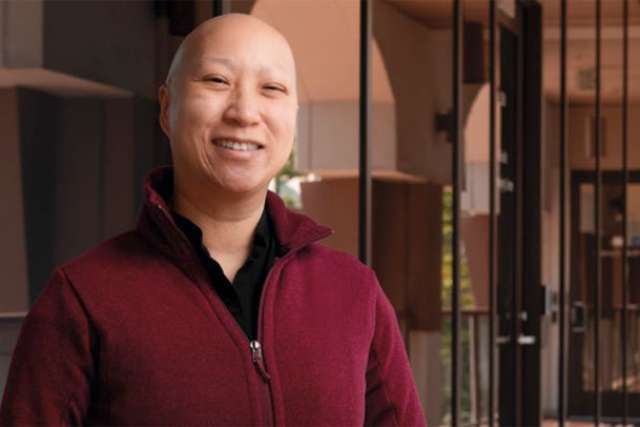The altercation at this year’s Academy Awards between Will Smith and Chris Rock following t he comedia n’s joke about Smit h ’s w ife, Jada Pinkett Smith, and her close-cropped hairdo brought global attention to the hairloss condition alopecia areata. While Pinkett Smith has spoken publicly since 2018 about her experiences with the autoimmune disorder, the discussion following the Oscars increased awareness of the condition that affects 2% of the population. As Alopecia Areata Awareness Month approaches in September, dermatologist Carolyn Goh, MD, founder of the UCLA Hair and Scalp Disorder Clinic, explains alopecia areata and its effects.
What is alopecia areata?
Dr. Goh: Alopecia is a broad term that we use for all kinds of hair loss. Alopecia areata is a type of hair loss that causes bald spots, and sometimes complete baldness, in men and women and children. It can affect people of all races and ethnicities at any age, though typical onset is during young adulthood.
What causes alopecia areata?
Dr. Goh: It’s an autoimmune condition and is genetically based. It often begins without warning with a bald spot here or there. Usually, the hair grows back by itself, but sometimes it doesn’t. Sometimes people will lose all their hair. It’s termed alopecia totalis if it’s 100% scalp hair loss. Alopecia universalis is when it’s 100% body hair loss. Sometimes people have both. Some people lose a little bit of eyebrows, but not all their body hair or not all their scalp hair.
How is alopecia areata diagnosed?
Dr. Goh: It’s usually by visual exam. There are tests that can be done to rule out other conditions. We can do a skin biopsy, where we take a sample of the skin and look at it under a microscope. But there’s no blood test.
What treatments exist?
Dr. Goh: Up until now, there have been no treatments approved by the U.S. Food and Drug Administration for alopecia. However, in June the U.S. Food and Drug Administration approved a medication already in use to treat rheumatoid arthritis, baricitinib, for the treatment of severe alopecia areata in adults. A recent study published in the New England Journal of Medicine found that baricitinib led to greater hair grown than a placebo in adults with severe alopecia areata. For less-severe cases, we often use topical, injectable or oral steroids to treat alopecia areata.
What are the psychological implications of alopecia areata?
Dr. Goh: A large part of the psychological impact is the lack of control and unpredictability of it. The social nature of hair is a big part of it, as well — the societal expectation for how people should look and what their hair should look like. It can really affect people’s self-esteem and sense of self. There was a recent story about a young girl in Indiana who committed suicide because she was being bullied for her alopecia, so that really speaks to the impact it can have on people.
“Hair loss is not urgent in the sense that it is lifethreatening, but it can be lifealtering.”
Is hair loss an urgent issue that should be addressed as soon as possible?
Dr. Goh: Hair loss is not urgent in the sense that it is life-threatening, but it can be life-altering, and if a patient is concerned about their hair loss, I do recommend that he or she speak with a physician. Many types of hair loss, including alopecia areata, can improve on their own. While wait times for an appointment in our clinic are lengthy, it still can be worthwhile to schedule a distant appointment in case the hair loss does not resolve.
Can you talk about your personal experience with this condition?
Dr. Goh: I developed alopecia areata when I was 3 years old. My hair fell out in patches first and then completely in about a year. I also lost some eyebrows. They grew back, but I basically didn’t have hair. Around age 5 or 6, I started wearing wigs. When I started college, I decided I didn’t want to do that anymore. I decided to go without any wigs. And I got comfortable with it.
I did have different treatments when I was younger to try to grow the hair back, but nothing really worked, so we stopped with that in my teens. My father is a doctor, and I always wanted to be a doctor. When I got to medical school, I wasn’t sure what I would want to study. But as we were learning about medicine and science, I kept thinking about alopecia, because it was a personal thing, and I realized that dermatology was what I wanted to do, specializing in hair loss.

